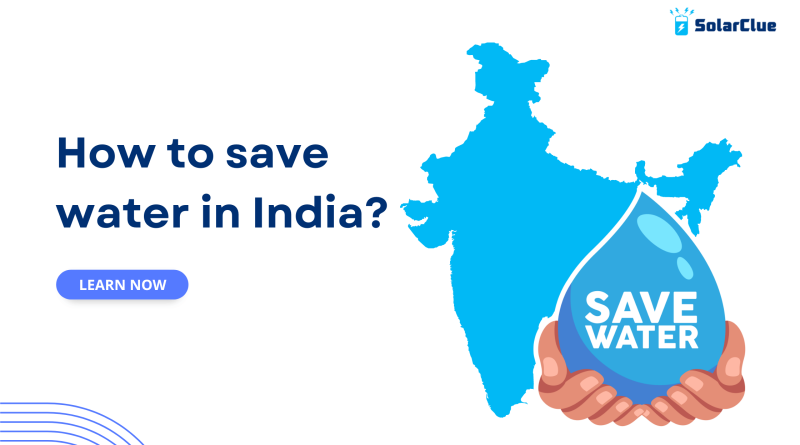How to save water in India?
Water is a precious natural resource that is essential for life. But there is a scarcity of water. The question is how can we save water? As the world’s population continues to grow and climate change affects weather patterns, it becomes increasingly important to conserve water and use it efficiently.
In this blog post, we’ll explore why we should save water and how we can do so? Let’s get started.
Table of Contents
Why Should We Save Water?
Water is very essential in our day to day lives. It is a natural resource and we should use it responsibly. Otherwise it will be very hard for our future generations. Given below are some of the reasons why one should save water:
- Water is a finite resource: Only a small percentage of the world’s water is fresh and accessible for human use.
- Growing water scarcity: Many regions are already facing water shortages due to factors like population growth, urbanization, and climate change.
- Environmental impact: Excessive water usage can harm ecosystems and biodiversity.
- Rising costs: As water becomes scarcer, the costs of accessing and treating water will increase.
- Energy conservation: Reducing water usage can also lead to energy savings, as treating and transporting water requires significant energy.
How Can You Save Water?
There are many ways in which you can save water. But the question is how can we save water at home? In this blog, we will discuss a way in which you can save water effectively.
In most Indian homes, a geyser is used to meet the daily hot water needs. But do you know it results in water wastage. When you switch on the hot water tap, it takes some time for the hot water to come out. This results in wastage of water. To reduce this, you must adopt a better alternative like a heat pump.
What is a Heat Pump and How Does It Work?
A heat pump is a water heating appliance just like a geyser. But its main difference lies in the way it works. A heat pump works on the principle of transferring heat from one place to another. Instead of using electricity directly to heat water, it uses electricity to absorb and transfer heat.
It consists of three main components:
- Exhaust fan: This fan draws in air from the surrounding environment.
- Compressor: The compressor compresses the refrigerant gas, increasing its temperature and pressure.
- Storage tank: The hot refrigerant gas passes through a coil inside the insulated tank, transferring heat to the water stored within.
Unlike traditional water heaters, heat pump water heaters do not waste water while waiting for hot water to reach the faucet. Instead, they maintain a steady supply of hot water in the insulated tank, ready for immediate use.
What Are the Other Benefits of a Heat Pump System?
A heat pump not only contributes towards saving water, but it also has other benefits, which are:
1. Cost-effective
Heat pump water heaters are highly energy-efficient, using up to 75% less electricity than traditional electric resistance water heaters. This translates into significant cost savings on your monthly utility bills. While the initial purchase cost may be higher, the long-term savings on energy costs can quickly offset the initial investment.
2. Long lifespan
Heat pump water heaters are designed to last longer than conventional water heaters. With proper maintenance and care, these units can have a lifespan of 15 years or more, whereas traditional tank-based water heaters typically need replacement after 8-12 years.
3. Manual temperature setting

Heat pump water heaters allow you to adjust the temperature of the water in the storage tank manually. This flexibility enables you to set the water temperature according to your specific needs, ensuring optimal energy efficiency and preventing excessive heating or cooling of the water.
4. Positive environmental impact
By consuming significantly less energy than traditional water heaters, heat pump water heaters have a lower carbon footprint and contribute to reducing greenhouse gas emissions. Additionally, their efficient operation helps conserve water by minimizing wastage.
5. Efficient in cold climates
Advanced heat pump water heaters are designed to operate efficiently even in colder climates. They can extract heat from cooler air temperatures, ensuring consistent hot water supply throughout the year. This makes them suitable for use across various regions in India, including those with cooler temperatures during certain seasons.
Conclusion
Saving water is crucial for a sustainable future. So how to prevent wastage of water? What can you do is installing Heat pump. It solves the problem of wastage of water. So it is time for every Indian household to invest in a heat pump to meet the daily hot water needs. Heat pump is not just about how can we save water at home. It also has other benefits. The most important one being that it reduces your electricity bill, due to its lower electricity consumption.
Visit SolarClue® to see the best heat pump water heaters. SolarClue® is an online marketplace where solar energy products are sold at discounts up to 50%.




